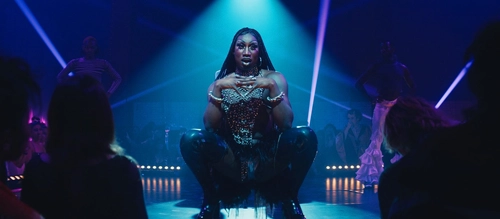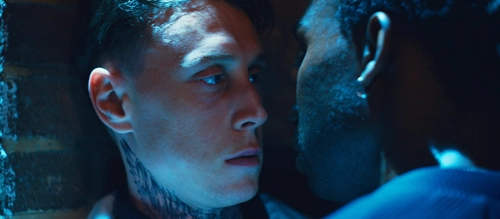Femme (2023) EIFF Review

Femme (2023)
Directors: Sam H. Freeman, Ng Choon Ping
Screenwriters: Sam H. Freeman, Ng Choon Ping
Starring: Nathan Stewart-Jarrett, George MacKay
Joining the ever-growing list of short films that were adapted into feature length movies is Femme, the feature length directorial debut of directing duo Sam H. Freeman and Ng Choon Ping. Taking an original concept from a short eighteen minutes and stretching it out to over an hour is a difficult task that many fail to complete effectively, but Freeman and Ping succeed.
The film follows Jules (Nathan Stewart-Jarrett), a drag queen who suffers a horrifying homophobic attack at the hands of Preston (George MacKay) after one of his shows. It tells of the sexual relationship that begins months down the line once Jules has recovered and is no longer in his drag makeup.
Speaking after the UK premiere at the Edinburgh International Film Festival (EIFF), director Sam H. Freeman discussed the idea of trauma and the way in which our minds can take traumatic events and turn them into a form of pleasure as a defence mechanism; taking something that hurt us and that we had no control over and turning it into something we get some form of joy out of and can thus have agency over. It is this very idea that Femme focuses on, and is the line it constantly walks throughout the film. In walking this line, Femme highlights its strengths: the writing, the direction and the performances.
The writing is a particular strength of the film. It shows a great understanding of trauma and a deep knowledge of the human psyche. In portraying the attack that Jules undergoes at the hands of Preston at the beginning of the film in such a horrific way, it is daring to place Jules back in the presence of Preston, and this allows the tension of the piece to build throughout. We are constantly wondering, “will Preston remember Jules? Will Jules get his revenge? Will something else blossom between the two?” By placing Jules and Preston into such an intimate situation together, Femme has us worried about what Preston will do but also intrigued by the dynamic that exists between them.
This relationship would not work if it were not for the two fantastic performances at the head of the film by Nathan Stewart-Jarrett and George MacKay. The writing certainly elevates their performances and provides them both with layers of character background and history, though their individual contributions equally elevate the material.
We see Jules in numerous situations with various different casts of characters and their own individual consequences, whether that be on stage and in drag, with Preston, or with Preston’s friends. We see Nathan Stewart-Jarrett perform different “characters” or “personalities” in each given situation, just as Jules would perform differently in his normal day-to-day life compared to his time on stage as a drag queen. And Stewart-Jarrett himself claimed that these different sides of Jules are signs of his past.
When Jules is around Preston’s friends he appears as a more traditional lad, fitting in with the group of hypermasculine men, which could be considered a sign of the character’s upbringing before he felt comfortable enough as a queer man. It is in these different masks, and through playing these different characters, that Stewart-Jarrett shines, showing not only an understanding of his lead protagonist but a depth with regard to his performance.

MacKay, too, brings a fantastic performance to the table, transforming himself physically from the vulnerability exuded in the likes of Pride (2014) into an intimidating and dangerous man, a character who looks like a typical street thug but whom we soon realise is much more than that. Just as Jules plays multiple characters, so does MacKay’s Preston, the two practically their own unique versions of Clark Kent and Superman. The beauty of the writing is that Jules discovers this as we do.
It is in the chemistry between Stewart-Jarrett and MacKay, and particularly the scenes in which they share the spotlight, that the two actors really shine. They bounce off each other incredibly well and their individual performances work to emphasise the power dynamic and the tension that is written in the script. One of the best examples of this is an early date scene in which Preston takes Jules to a fancy restaurant and exhibits his more gentle, charming side; that which he clearly hides from his friends. Jules appears small in the frame, closed off and taking very little space at the table, whereas Preston appears larger than life, stretched out over his seat and his body open, taking up much more space and showing his power not just in that moment but in their dynamic overall. It is a scene in which script, direction, cinematography and performance come together to best serve the story.
This is one of many moments in which the first-time filmmakers behind Femme prove their understanding of the process and their ability to bring their idea to life. As a directorial duo, Freeman and Ping impress with their skill, bringing style to the film via neon lighting and brightly coloured clothing, wonderful imagery that uses juxtaposition to tell of the pleasure and trauma that are so prominent throughout the story, and directing wonderfully detailed lead performances that anchor the emotion held within the script. Femme is a wonderful film that is just as fun as it is horrific; an intriguing mix of trauma and pleasure.
2023 feature directorial debut Femme is a tightly packed punch of a film from two new directors expressing their boundless potential. Though some may find it difficult to see someone’s attacker placed in a position of both power and intimacy with the person they’ve attacked, those that can bear the more hard to watch scenes are in for a treat of a film that dives deep into human relationships and treats us to a great first feature.
Score: 18/24
Recommended for you: More Coverage from EIFF

